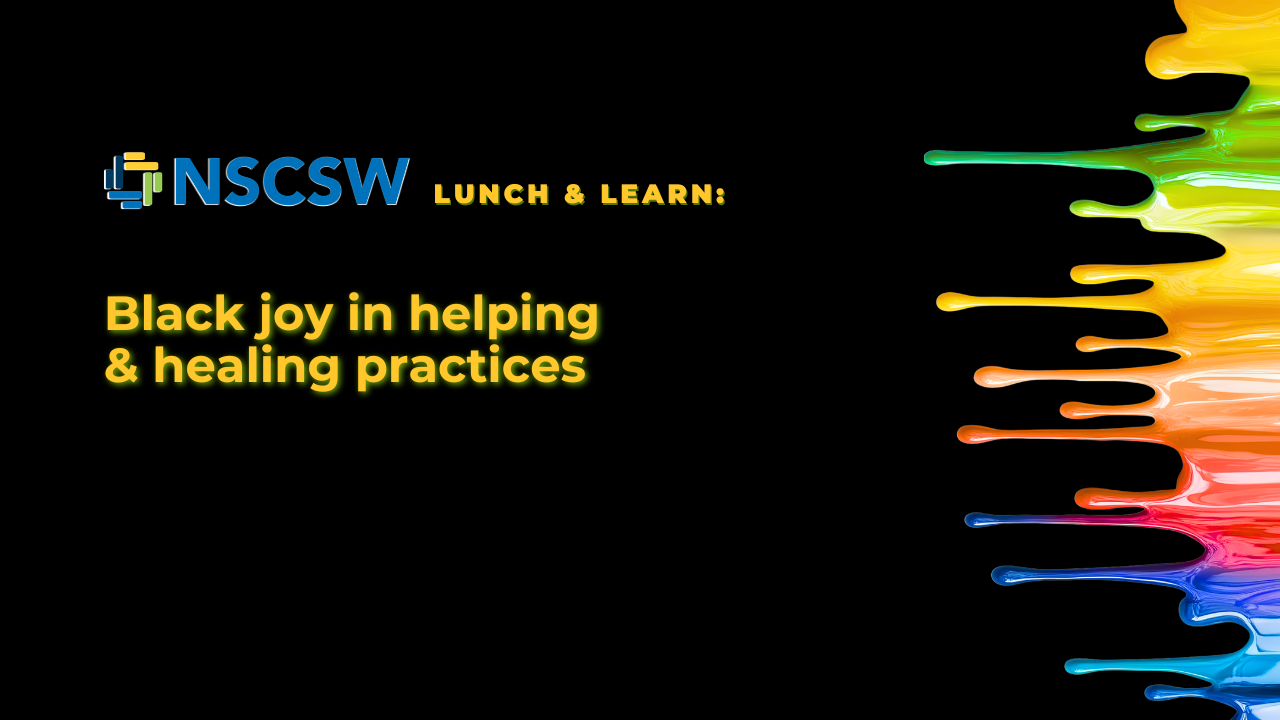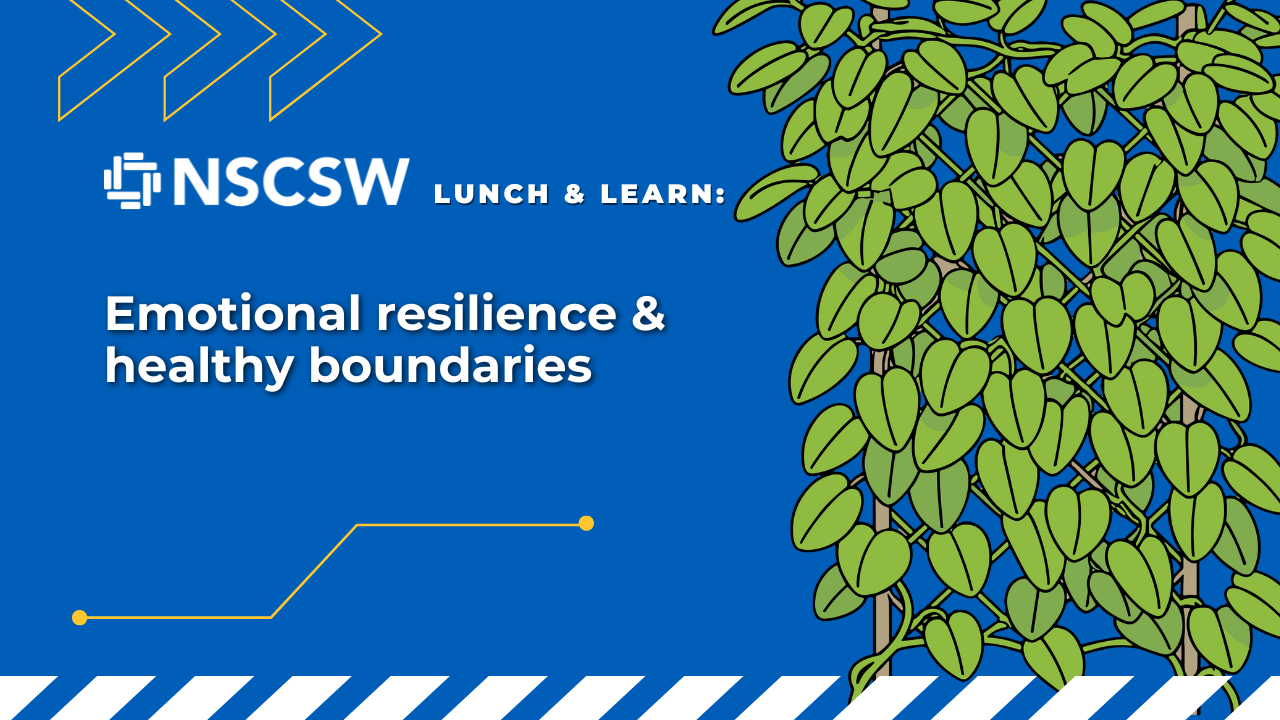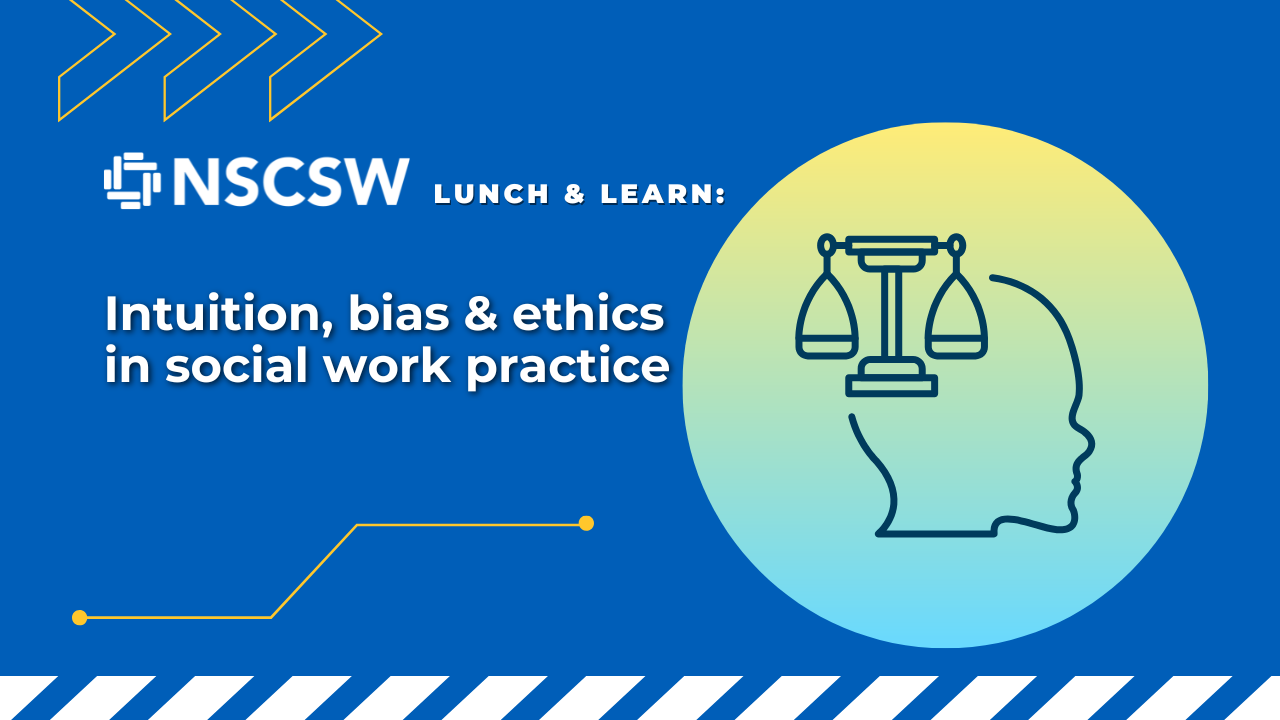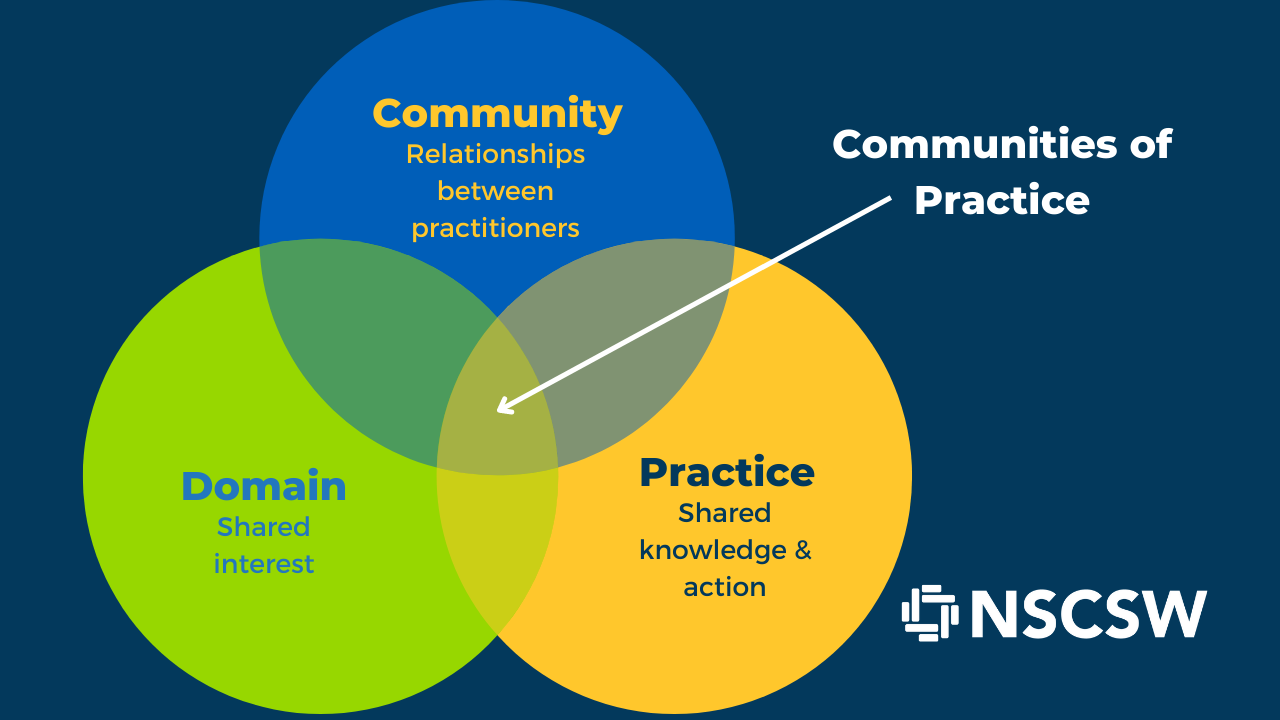Lunch & learn: Black joy in healing & helping practices

Media release — NSCSW dismayed by government’s decision to repeal the Social Workers Act
FOR IMMEDIATE RELEASE
25 Feb 2026
KJIPUKTUK (HALIFAX, NS) – The Executive Council of the Nova Scotia College of Social Workers (NSCSW) is deeply disappointed by the government’s decision to repeal the Social Workers Act without prior notice or consultation. Proactive regulation depends, in part, on a collaborative relationship of trust between the College and government.
The College has a longstanding commitment to ensuring the safe and ethical delivery of social work practice in Nova Scotia, which includes a critical advocacy role.
For decades, the NSCSW has worked tirelessly to address risks and challenges in the field of social work. The College has been a strong advocate for bio-psycho-social mental health services, strengthening child and family well-being, and pursuing ethical solutions to systemic issues, such as the staggering reality of 40,000 children living in poverty. Notably, the College’s advocacy efforts led to the creation of the Office of Children and Youth in Nova Scotia.
The Executive expresses concern that the repeal of the Social Workers Act may silence the College’s advocacy voice — a voice that has consistently championed the needs of marginalized and vulnerable populations.
“This decision marks a troubling shift,” said Robert Wright, President of the NSCSW. “It erodes the independence of social work as a self-regulated profession and places it under government watch, rather than maintaining an independent voice that works in the public’s best interest.”
While the College remains committed to collaborating with the government to bring the profession of social work under the Regulated Health Professions Act (RHPA), the NSCSW will continue to use its mandate and expertise to advocate for ethical, effective, and equitable social work practices in Nova Scotia. The College is determined to ensure that the interests of the most vulnerable members of society — the very people social workers serve — are not overlooked.
The College calls on the government to engage in meaningful dialogue with the NSCSW to ensure that the profession of social work can continue to operate independently and in the best interest of the public.
-30-
About us:
The Nova Scotia College of Social Workers serves and protects Nova Scotians by effectively regulating the profession of social work. We work in solidarity with Nova Scotians to advocate for policies that improve social conditions, challenge injustice and value diversity.
For more information or to arrange interviews with NSCSW spokespersons, contact: Rebecca Faria, communication coordinator for NSCSW (902-429-7799 ext. 227, [email protected]).
Childhood on the brink: A response to the 2026-27 provincial budget

The recently tabled provincial budget by Tim Houston’s government is a stark reminder of the policy choices that continue to fail Nova Scotia’s most vulnerable, our children. Instead of addressing the systemic issues driving child poverty, the budget doubles down on austerity measures that deepen inequality and jeopardize the province’s long-term economic and social health.
Children & youth have been kept waiting
The announcement of funding for a new provincial child and youth advocate is a welcome and long-overdue step to protect the rights and well-being of vulnerable children and families. However, this initiative is undermined by the very budget that introduced it. Urgent action is needed to ensure the office is swiftly established and adequately resourced to meet the growing needs of children and families—needs that have been exacerbated by the government’s broader policy decisions.
While the provincial budget includes an allocated $300,000 in funding, this is a mere fraction of the $6.5 million recommended for annual operating expenses. Without sufficient resources, this office cannot fulfill its potential as a lifeline for vulnerable children and families.
The creation of this office is a critical step forward, but it cannot succeed in isolation. The broader context of the budget reveals a troubling pattern of rising inequality and systemic neglect. Cuts to social programs, inadequate investments in housing and food security, and a lack of meaningful support for families leave children and families more vulnerable than ever.
This budget is not just a missed opportunity—it’s a deliberate choice to prioritize austerity over equity, leaving Nova Scotia’s most vulnerable to bear the brunt of its consequences.
A broken promise, a devastating reality
In 1989, Canada vowed to eliminate child poverty by 2000. Fast forward to 2026, and Nova Scotia remains one of the worst-performing provinces in the country, with over 40,000 children—nearly one in four—living below the low-income threshold.
This budget does little to change that trajectory. Instead of bold, transformative action, it offers austerity which inevitably will be leaving families to struggle in a system that prioritizes profits over people.
The economic cost of neglect
Child poverty is not just a moral failing; it’s an economic disaster. The cost of poverty in Nova Scotia is estimated at $2.4 billion annually, draining resources through lost productivity, increased healthcare costs, and the strain on social services. Yet, this budget continues to underfund critical social programs, perpetuating a cycle of poverty that will cost the province far more in the long run. The government’s refusal to meaningfully invest in upstream solutions, like affordable housing, universal childcare, and income supports, ensures that these costs will only grow.
Families on the brink
The budget’s failure to address systemic inequities disproportionately harms lone-parent households, racialized communities, and newcomers. Nearly 60% of children in lone-parent families live in poverty, while racialized children face poverty rates twice as high as their non-immigrant peers. These are not just abstract statistics, they reflect the harsh realities of families forced to make impossible choices, such as deciding between paying rent or buying groceries, heating their homes or feeding their children. Despite this, the budget offers no meaningful relief for these vulnerable groups, instead advancing policies that widen the gap between the wealthy and everyone else.
The situation is further compounded by the government’s plan to cut the public service by 5%, slash $130 million in program grants, and reduce $1 billion in government expenditures over the next four years. These cuts will disproportionately impact the same vulnerable groups, particularly as no clear political directive has been provided on where or how these reductions will be made. This lack of planning means there has been no assessment of how these cuts will affect core services, leaving critical programs at risk.
The predominantly female workforce in public service roles will bear the brunt of these reductions, further entrenching inequality. No amount of resource extraction can “fix” this issue. In fact, jurisdictions that rely heavily on resource extraction often see greater inequality, as the benefits are concentrated among the wealthy while vulnerable communities are left behind. This budget doubles down on a strategy that history has repeatedly shown only exacerbates inequity.
Poverty is a political choice
This budget is a glaring example of how poverty is perpetuated by deliberate political choices. By prioritizing tax cuts for the wealthy and doubling down on resource extraction over meaningful investments in social infrastructure, the government is actively choosing to deepen inequality.
The budget’s failure to address systemic inequities is evident in its refusal to raise income assistance to livable levels. Lone-parent families, who are already four times more likely to live in poverty, will continue to face impossible choices as they remain thousands of dollars below the low-income threshold.
Meanwhile, the government’s tax policies disproportionately benefit higher-income earners, exacerbating the growing income divide. For example, recent tax cuts have created a $500 million revenue shortfall, yet the budget offers no meaningful measures to close this gap or redistribute wealth to those who need it most.
The neglect of affordable housing is another stark example of misplaced priorities. While the budget includes funding for just 1,000 affordable housing units and rental subsidies for 10,000 Nova Scotians, this barely scratches the surface of the province’s housing crisis, where thousands remain in core housing need. Without bold investments in housing as a human right, families will continue to face housing instability, a key driver of poverty and poor health outcomes.
The decision to maintain inadequate income assistance levels, underfund public education, and neglect affordable housing is not a fiscal necessity—it’s a policy choice. And it’s a choice that leaves over 40,000 children and their families struggling to survive in a province that has the second-worst child poverty reduction rate in Canada since 1989.
The high cost of cheap social policy
Nova Scotia spends just $1,300 per capita on social protection—less than half the national average and the lowest of any province in Canada. This chronic underfunding of social programs is a policy choice that has cascading consequences across the entire system. By starving social supports, the government is not saving money; it is simply shifting the costs to emergency rooms, homeless shelters, and food banks.
The government’s record spending on healthcare, while seemingly impressive, fails to address the root causes of poor health. Decades of research show that health outcomes are far more influenced by the social determinants of health, such as income, housing, education, and food security, than by healthcare spending alone. A landmark 2018 study by Dutton and colleagues found that increasing social spending relative to healthcare spending leads to better health outcomes, including lower rates of avoidable mortality and longer life expectancy. Conversely, stagnant social spending results in higher healthcare costs without improving health outcomes.
This budget continues to ignore these findings, pouring billions into downstream healthcare costs while neglecting upstream investments in social programs that could prevent illness and reduce the strain on the healthcare system. For example, 38% of children in Nova Scotia live in food-insecure households, yet the budget offers no significant measures to address this crisis. Similarly, the failure to expand affordable childcare or adequately fund public education leaves families without the support they need to thrive, perpetuating cycles of poverty and poor health.
The evidence is clear: investing in social programs is not just a moral imperative, it’s an economic necessity. By choosing to underfund social protection, the government is not only failing Nova Scotians today but also undermining the province’s long-term economic and social health. It’s time to shift the focus from austerity to equity, from short-term cost-cutting to long-term investment in people.
A roadmap for change
The path forward is clear, and it starts with bold, courageous policy action. The Nova Scotia Alternative Budget 2026 offers a blueprint for a more equitable and sustainable future. By improving tax fairness, investing in the caring economy, and prioritizing green growth, the province can address its fiscal challenges while building a stronger, more inclusive economy.
Key actions for immediate impact:
- Increase family incomes: Raise the minimum wage, expand income assistance, and enhance the Nova Scotia Affordable Living Tax Credit to ensure families can meet their basic needs.
- Transform social systems: Shift to a rights-based, trauma-informed model for child welfare and social assistance, ensuring no family lives below the poverty line.
- Guarantee housing & food security: Treat housing and food as fundamental rights, with investments in affordable housing and programs to eliminate food insecurity.
- Expand universal services: Enhance access to universal healthcare, childcare, education, and public transit, while making critical infrastructure like energy and internet more affordable.
- Invest in people, not profits: Redirect resources from for-profit ventures, like private long-term care homes, to public and non-profit services that benefit all Nova Scotians.
The time to act is now
This budget was an opportunity to address the urgent needs of Nova Scotia’s children and families. Instead, it doubles down on policies that deepen inequality and undermine the province’s future. The government has the fiscal capacity to make targeted investments that would yield significant returns, both economically and socially. What’s lacking is the political will.
Nova Scotia’s children cannot wait. It’s time for leadership that prioritizes people over profits, equity over austerity, and long-term prosperity over short-term gains. The choices we make today will define the future of our province. Let’s choose a future where every child has the opportunity to thrive.
Media release — NSCSW responds to provincial budget: Urgent need to scale up Office for Children & Youth
FOR IMMEDIATE RELEASE
24 Feb, 2026
KJIPUKTUK (HALIFAX, NS) – The Nova Scotia College of Social Workers (NSCSW) is pleased to see the funding announcement for a new provincial child and youth advocate, but is calling for urgent action to ensure the new office is swiftly established and adequately resourced to address the growing needs of vulnerable children and families across the province created by this budget.
While the provincial budget includes the long-awaited protection of this critical office, the lack of broader investments in social supports leaves children and families at greater risk.
A critical step, but not enough
The proposed budget for the Office for Children & Youth allocates $300,000 in funding, a fraction of the $6.5 million NSCSW has recommended for annual operating expenses of an independent child and youth advocate in this province.
Alec Stratford, executive director and registrar of the NSCSW, emphasized the importance of scaling up the Office for Children & Youth without delay. “This office has the potential to be a lifeline for vulnerable children and families,” said Stratford, “but it must be set up quickly and scaled effectively to meet the pressing needs our communities will face due to decisions in this budget.”
The establishment of the Office for Children & Youth is a long-overdue measure to protect the rights and well-being of Nova Scotia’s most vulnerable. While this is a positive step, the broader context of the provincial budget paints a troubling picture.
Broader budget concerns
The new budget fails to adequately address critical issues such as housing, food security, and energy costs. Cuts to community programs and social development services further exacerbate the challenges faced by vulnerable populations. Rising inequality undermines the safety and stability of children and families.
“The Office for Children & Youth is a vital piece of the puzzle, but it cannot operate in isolation,” Stratford explained. “We need a comprehensive approach that addresses the root causes of inequality and provides the supports families need to thrive.”
Call to action
The NSCSW is calling on the provincial government to act swiftly to establish and scale up the Office for Children & Youth, and to invest in policies that prioritize the well-being of children and families.
-30-
About us:
The Nova Scotia College of Social Workers serves and protects Nova Scotians by effectively regulating the profession of social work. We work in solidarity with Nova Scotians to advocate for policies that improve social conditions, challenge injustice and value diversity.
For more information or to arrange interviews with NSCSW spokespersons, contact: Rebecca Faria, communication coordinator for NSCSW (902-429-7799 ext. 227, [email protected]).
Lunch & learn: Emotional resilience & healthy boundaries

Lunch & learn: Intuition, bias & ethics in social work practice

Professional Development: 2025 Reflections & Plans for 2026

Professional development is at the heart of ongoing development of knowledge, skills, and values in the ever-changing landscape of social work practice. Social workers across Nova Scotia are engaging in life-long learning opportunities helping them to provider safe(r) social work services in community, clinical and hospital settings, education, private practice, and more.
While the 2025 registry year has just ended, we have lessons and insights from the year to share and insights into what NSCSW has planned for PD in 2026. We plan on continuing to offer PD content in alignment with our new Code of Ethics & Standards of Practice, our Safe(R) Social Work Framework, and emerging needs and issues. We are also developing new ways to integrate learning experiences through our Circle of Learning program for a small group of interested members.
Output & outcomes
In 2025 NSCSW offered and supported over 65 professional development activities for social workers. Throughout the year we engaged with over 2300 participants and offered 130+ hours of learning content. Many of these activities were lunch and learns, webinars, and workshops offered by NSCSW, while some were sponsored self-hosted activities in communities run by social workers. Across the PD activities, we supported learning and development in each of our mandated PD categories, along with many activities deepening social workers’ learning in anti-oppression, systemic issues, complexity, and decolonization. Each session and activity was offered in support of the provision and delivery of equitable, ethical, and responsible social work services.
There are many activities from this past year worth highlighting, including:
- Virtual mini conference: Building connections & activating hope
- Post-graduate seminar: Bowen family systems theory
- Workshop: Anti-oppressive documentation
- Roadshows: New Code of Ethics & Standards of Practice
- Communities of Practice & closed spaces for:
- Black & African Nova Scotian social workers
- Mi’kmaw and other Indigenous social workers
- 2SLGBTQIA+ social workers
- In-person mini-conference: Transforming social work’s role in addressing GBV/IPV
Throughout the year we collected feedback from participants in our learning activities. Out of the 2300 people engaged, we received anonymous evaluation survey responses from 446 respondents. The responses from the survey forms, along with feedback provided by email and in the sessions indicate that members and the partners who attend our PD offerings see them as valuable and impactful in the development of social work competence.
- When respondents were asked, “How would you rate your learning experience overall?” The average response is 8.8/10, with the most common response being 10/10.
- When respondents were asked, “How applicable was this PD activity to your practice area and context?” The average response was 8.7/10 with the most common response being 10/10.
- When asked how well we met our objectives in developing knowledge, skills, and values, respondents reported:
- Know more about the topic area
45% agree, 44% strongly agree (total 89% supportive) - Have more skills related to the topic area
49% agree, 31% strongly agree (total 80% supportive) - Have shifts in feelings, attitudes, and/or values related to the topic area
43% agree, 30% strongly agree (total 73% supportive)
- Know more about the topic area
We trialed out new learning opportunities this year, including the closed-group communities of practice. These spaces were offered with the belief that communities of practice grounded in shared lived experiences and realities can support social workers in deepening and strengthening their practice.
- “I didn’t feel intimidated or judged and I could be myself.”
- “I feel empowered and feel proud of my peoples.”
- “I feel more hopeful. The shared wisdom and listening space was really helpful.”
- “I feel more support and hope for our collective ability to do transformative work in this province for our communities.”
- “Increased positive energy and collective hope.”
In our evaluation survey we asked participants, “As a result of this activity, what is different for you now.” Out of the 403 responses, these are the general themes across our learning activities.
- Increased Awareness and Reflection: Participants gained a deeper understanding of their practices, including the importance of anti-oppressive approaches, critical self-reflection, and the impact of their actions and documentation on clients and communities.
- Commitment to Ethical and Inclusive Practices: Many expressed a renewed focus on aligning their work with ethical standards, decolonization, and culturally responsive practices, particularly in documentation and client interactions.
- Practical Tools and Strategies: Participants appreciated learning concrete skills, having access to templates and frameworks to improve their documentation, developing their advocacy, and overall, a sense of professional development.
- Connection and Community Building: The activities fostered a sense of shared purpose, reducing feelings of isolation and encouraging collaboration and networking among social workers.
- Focus on Wellness and Self-Care: Many were reminded of the importance of prioritizing self-care and community care to prevent burnout and maintain effectiveness in their roles.
Throughout 2025, we also occasionally received critical feedback, with members expressing unhappiness and frustration with the role of the NSCSW, our focus on social justice and decolonization, and occasionally making disparaging comments about facilitators and hosts. While we invite critical feedback, there were times where the feedback was unwarranted and counter to the values and ethics of the social work profession. For this reason, the 2026 evaluation survey is no longer anonymous and we will aim to follow-up with unwarranted feedback.
Plans for 2026
With the 2025 registry year completed, we turn our attention to 2026. This year, based on member feedback, our guiding documents and strategic priorities, we will be continuing to develop our PD program including webinars, lunch and learns, workshops, and our first in-person conference since 2019.
Value 7: Providing culturally responsive competent professional services
Guiding Principle 7.1: Social workers are committed to the ongoing development of their professional abilities and knowledge, aiming to ensure the delivery of culturally responsive professional services.
NSCSW Code of Ethics & Standards of Practice (2026)
Professional development is central to the ongoing growth of social work practice, and this year we will continue with many of our offerings for members, allied health professionals, and community partners. Please look to our member newsletter and follow us on our Eventbrite page to stay informed about our upcoming offerings. We aim to announce our learning activities at least 6 weeks before the day of the session, with workshops and more substantial offerings having 8-10 weeks of promotion. Many of our sessions will continue to take place at 12:00 pm, and we will continue to record and upload webinars and lunch & learns whenever possible to our YouTube account.
On May 28 and 29 we will be holding our in-person conference, Navigating Complexity Together. The two-day conference is focused on supporting the development, connections, learning, and growth of Nova Scotian social workers in navigating complexity in practice as we wrestle with the existential issues of our time. The conference will also be an opportunity to reflect on 10 years of NSCSW operating as the regulatory body for social workers in Nova Scotia. The conference will be held at the Black Cultural Center for Nova Scotia in Cherry Brook. We have received incredible proposals from social workers across Nova Scotia and Canada, which speak to our conference theme and strive deepen the learning and practices of social workers in social justice, equity, and decolonization. We are incredibly excited for this upcoming conference and look forward to releasing more information and early-bird tickets in a few weeks.
We will continue to offer our open communities of practice and our self-care focused sessions (Cultivating Our Wellness). We will also continue with our closed-group communities of practice with four sessions each.
It is our hope to continue with our in-person touring Roadshow in the fall of 2026. Last year we visited Yarmouth, New Minas, Halifax, Antigonish, and Sydney. This year we will aim to visit 5-6 communities across the province with workshops focused on social work ethics and advocacy.
With the success of our Anti-Oppressive Documentation Workshop in fall of 2025, we are aiming to potentially reoffer this session along with other in-person and virtual workshops. We are currently running a four-part virtual series building on our Guidelines for Parenting & Decision-Making Assessments, with the second session taking place on March 9, 2026. On April 24, 2026, we will offer “Anger Management – Trauma & Social Justice Informed” with Jacqueline (Jackie) Barkley, MSW, RSW, at the Halifax North End Memorial Library; details for this in-person workshop will be announced soon.
We are developing further workshop ideas and webinars around relational and restorative practices, Black joy, queer joy, artificial intelligence, homelessness, sex work, social polarization and violent extremism, intuition and social work ethics, gender-based and intimate partner violence, and more! All of our learning activities are focused on deepening knowledge, skills, and values related to safe(R) social work practice.
As in previous years, we also encourage all our members to coordinate and plan their own PD opportunities. We have budget available to support external events. We also love the opportunity to come to your place of employment and deliver PD opportunities, either in-person or virtually. If you are interested in this opportunity, email me with a proposal at [email protected].
As part of our ongoing effort to embed EDIRA (equity, diversity, inclusion, Reconciliation, and accessibility) in our governance, administration, and programming, we have kicked of our Circle of Learning cohort this month with 20 members participating. This cohort will be exploring ways to plan for, complete, integrate, and report on PD in a different format than is expected as part of our PD Program. These participants will still be required to complete their minimum required hours and categories/sub-categories as part of the PD program, but how they integrate that learning and report on their growth as a social worker is fundamentally different. While this cohort is already started, we wanted to share the template document we are using to support participants, along with our presentation from our first session. If you are someone who benefits from some self-reflection and planning when it comes to your PD, you might benefit from using the template document to support your PD activities throughout the year. While only members participating in the Circle of Learning program can submit this document as part of their annual renewals for 2026, we are exploring the potential for this program to become more widely available in 2027.
As a regulatory college, we are proud to be able to support our members in developing their practices as professional social workers. In 2025 we had a record year with many offerings supporting social workers, allied health professionals, and community partners to practice more ethically and equitably. For this year, we intend to do the same while deepening our commitment to education and opportunities focused on social justice, anti-racism, decolonization, and ethical practice.
Strength in unity: Moving forward with purpose, prosperity, power & progress

This year’s African Heritage Month theme, “Strength in Unity: Moving Forward with Purpose, Prosperity, Power, and Progress,” is a powerful reminder of the transformative potential of collective action. It speaks to the strength that emerges when African Nova Scotians and people of African descent unite with a shared vision. Unity is not just a concept, it is an active force for change that strengthens communities, advances justice, and creates new opportunities.
This year’s theme also reflects the ongoing journey beyond the United Nations International Decade for People of African Descent. It calls on us to carry forward the principles of recognition, justice, and development, harnessing our collective wisdom, resilience, and creativity to build prosperity in all its forms—cultural, social, economic, and spiritual.
A legacy of resilience & contribution
The origins of African Heritage Month trace back to 1926, when Dr. Carter G. Woodson established Negro History Week to recognize the achievements of African Americans. Over time, this observance expanded, becoming Black History Month in 1976 and officially recognized in Canada in 1995. Nova Scotia has been a leader in this recognition, establishing African Heritage Month in 1996 and continuing to honor the profound influence of African Nova Scotians on the province’s cultural and social fabric.
From the Black Loyalists and the Maroons to the Southern American Black Refugees, the history of African Nova Scotians is marked by resilience and perseverance in the face of adversity. Their stories are central to our shared history and underscore the need for recognition, justice, and restitution.
Social work’s commitment to reparations
As social workers, we have a moral and material obligation to address the deep-rooted history of anti-Black racism in Nova Scotia and Canada. The Nova Scotia College of Social Workers is unequivocally committed to reparations, an essential step toward healing and justice. Reparations go beyond monetary redress; they encompass a comprehensive approach to addressing historical and systemic injustices through five key forms:
- Restitution: Restoring lost rights and reversing the injuries endured by African Nova Scotians and their ancestors.
- Compensation: Providing economic redress for damages caused by systemic discrimination in areas like employment and healthcare.
- Rehabilitation: Restoring land, acknowledging stolen intellectual properties, and offering services that foster healing and recovery.
- Satisfaction: Public apologies, commemorations, and tributes to honor the victims and survivors of historical injustices.
- Guarantees of Non-repetition: Preventing future violations through ethical codes of conduct, education, and awareness.
These principles are enshrined in the College’s new Code of Ethics, which emphasizes the importance of advocating for the rights of African Nova Scotians and persons of African descent. Social workers are called to build their knowledge of systemic hate, inequities, and anti-Black racism, applying an Africentric approach to their practice. This includes understanding and respecting African traditional cultures, communities, and support systems, and striving for equity in all aspects of their work.
Moving forward together
The theme “Strength in Unity: Moving Forward with Purpose, Prosperity, Power, and Progress” is a call to action. It reminds us that unity has always been a source of strength for African Nova Scotians, sustaining them through generations of challenge and change. By honouring our elders, standing together, and committing to reparative practices, we can create opportunities and shape a future where the leadership, culture, and contributions of African Nova Scotians are reflected in every part of this province.
As we celebrate African Heritage Month, let us also renew our commitment to equity, justice, and respect for human rights. Together, we can build a more inclusive and equitable society—one that honors the past while moving forward with purpose, prosperity, power, and progress.
Related opportunities
NSCSW events
- Feb 27 — Virtual community of practice for Black / African descent social workers only
- Mar 27 — Lunch & learn: Black joy in helping & healing practices
Partner events
- Feb 12 — Panel Discussion on: African-centred Approaches to Black Health (Dalhousie School of Social Work Diversity & Equity Committee, evening conversation series)
- Feb 26 — Panel Discussion on: African-centred Approaches to Black Health (Dalhousie School of Social Work Diversity & Equity Committee, evening conversation series)
- Feb 27 — 30 years of Black History Month: Honouring social work in the Black community Across Generations (CASW)
- Feb 28 — National Africentric Social Work Circle (CASW)
Community events
Check the Black Cultural Centre community calendar for events scheduled throughout the province.
Webinar series: Parenting & decision-making assessments (part 2 of 4)

Connections: Communities of Practice

Sign up for Connection
CONNECTION is the official newsletter of the Nova Scotia College of Social Workers.






